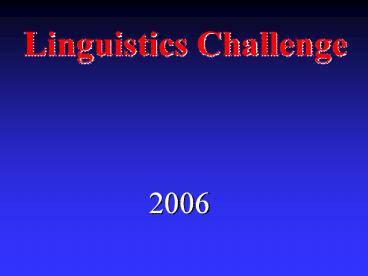Linguistics Challenge - PowerPoint PPT Presentation
Title:
Linguistics Challenge
Description:
Compare to simple analogy: Kurmanji Kurdish problem. Two stage logic: Hawaiian ... Did you know that the English system is also partly logographic? Think about it. ... – PowerPoint PPT presentation
Number of Views:245
Avg rating:3.0/5.0
Title: Linguistics Challenge
1
Linguistics Challenge
- 2006
2
Sponsored by . . .
- The Department of Linguistics
- Associate Dean of Humanities
- Cambridge University Press
- Mail Boxes, etc. Willamette Plaza
- Smith Family Bookstore
- University of Oregon Bookstore
3
What is the Linguistics Challenge?
- Originally Linguistic Olympics
- Problem-solving activity
- Students solve linguistic problems (or puzzles)
in languages they have never learned.
4
How is the Linguistics Challenge implemented?
- University-based academic competition for
secondary students. - Interactive web-based resource for secondary
students and teachers. - International academic competition.
- Future?
5
History of the Linguistic Olympics
- Started in Moscow, Russia, in 1965.
- Expanded to St. Petersburg, Russia, in 1995.
- Implemented as a university-based academic
competition in Eugene, Oregon, in 1999, 2000 and
2001. - International Competitions in 2003 (Borovetz,
Bulgaria), 2004 (Moscow, Russia), and 2005
(Leiden, Netherlands). - Currently web-based only in USA.
6
What are these puzzles like?
- Real languages -- no simplification or made-up
data. - Languages treated with respect not curiosities.
- Demographic and geographic information given
- Self-sufficient
- No typos!
7
What are the best puzzles like?
- Illustrate some cross-cultural fact
- Logic involving two or more stages not simple
analogy.
8
What does two-stage logic mean?
- Compare to simple analogy Kurmanji Kurdish
problem - Two stage logic Hawaiian
9
What types of puzzles are there?
Three types (more or less)
- Analyze and translate
- Match translations
- Writing systems
10
Sample 3 Writing Systems
- There are basically three types of writing
systems - Alphabets
- Syllabaries
- Logographic systems
11
In an Alphabet . . .
- each character represents a consonant . . .
b d g p t k v s z j m n l r
, etc.
or a vowel . . .
a e i o u
, etc.
12
Alpha is the first letter of the Greek alphabet
?, a
and Beta is the second
?, ß
bet
Alpha
13
In a Syllabary . . .
each character represents a syllable . . .
ba de gi po tu ka ve si lo yu
, etc.
14
Many languages, like Russian, use a combination
of a syllabary and an alphabet.
For example
?
. . . is pronounced ya in Russian.
e
. . . is pronounced ye in Russian.
15
In a Logographic System . . .
each character represents a whole word . . .
dog cat girl parsimonious
, etc.
16
Many languages use logographic systems. For
example, in the system used for Mandarin and many
other languages . . .
. . . means mouth.
and . . . means
person.
17
Did you know that the English system is also
partly logographic?
Think about it. How do you pronounce these words?
?
2
7
heart, or love
two
seven
18
Logographic systems are very useful. Since they
represent concepts rather than sounds they can
allow people who speak different languages to
communicate. So if I am visiting a country where
I do not speak the language, I can write numbers
to express my thoughts.
19
Sample 3 Writing Systems
Luvian
In the early 20th century, archeologists had
collected a large quantity of inscriptions in an
unknown ancient language. Unfortunately, these
writings were totally incomprehensible until one
scholar discovered the key. Many of the words in
the inscriptions were names of regions, cities or
kings. This key allowed the scholars to unlock
the secrets of the Luvian empire.
20
Some of the important names were the following
Regions Khamatu, Palaa. Cities Kurkuma,
Tuvarnava. Kings Varpalava, Tarkumuva. The
following are the inscriptions that correspond to
these names. Your job is to match each
inscription with the name that it represents. The
process you use to solve this puzzle is very
similar to what archeological linguists actually
do when they discover writings and inscriptions
in unknown languages
21
Now, the next step is to use what you have just
learned to determine what the Luvian inscription
would probably be for each of the following
names
The king Parta The region Tuva
The king Armura The region Narva
The region Tarmu
22
Assumptions
- All puzzles represent real languages.
- There is only one correct solution.
- All puzzles are solvable on their own.
- No outside knowledge is necessary.
- The introduction is important.
- You can earn points on a puzzle, even if you
dont finish it. So write something!
23
Expectations
- No collaboration (sorry).
- You may leave at any time.
- You probably wont finish all the puzzles.
- When you hear the music, please stop work.
24
Prizes
- Gold, Silver and Bronze medals will be awarded
in two categories. The winners will be announced
and prizes awarded in the EMU Ballroom this
afternoon or at your school.
25
Are you ready to begin?
You are the brave, the bold the fearless. When
you see the flame, you may open your puzzle
booklet. When you hear the music again, it will
be time to stop. Good Luck!
26
Linguistic Challenge
- 2000































